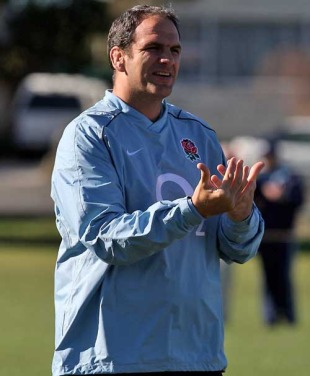|
Comment
England offer reason for hope
Hugh Godwin
June 29, 2010

England manager Martin Johnson would appear to have plenty to smile about with the Rugby World Cup a little over a year away
© Getty Images
Enlarge
If the secret of great comedy is timing, the same is true of international rugby. When Joe Simpson was injured having his shoulder wrenched in a tackle by Harlequins' Danny Care at Twickenham last Christmas, the young Wasp was in line for an England debut during the Six Nations Championship (the coaches had earmarked one squad place for an emerging scrum-half). If Simpson had done well, he and Care might have been in pole position for the recent tour Down Under; instead Leicester's Ben Youngs was allocated the Six Nations spot, he came through stormingly on the tour and he now looks like a first choice or at least the equal of Care, who must buck his ideas up after a season when his game did not noticeably improve. Now you might argue that talent will always out, and that if Youngs was the best scrum-half of the three named above, he would have seen the others off, come what may. But talent is nothing without opportunity. Youngs may have been forced to kick his heels with Leicester; then, who knows, he could have picked up an injury like Simpson's and, hey presto, he could forget the next World Cup. These unknowns in an ever changing world turn coaches' hair grey and you could detect a little lightening of Martin Johnson's bonce during the tour. Johnson would surely love the 32 members of his elite squad named this week to be contemplating a couple of months' rest, than a Super 14-length season followed by another good rest before the World Cup. Instead the likes of Youngs will be back training very soon and in September hacking away at the coalface again of a 40-week season of Premiership, Heineken Cup and Tests with only the occasional break. For now, though, in the downtime of summer England appear to be closer to a squad with decent competition in most positions than at any stage since the golden year of 2003. And time itself has been a healer. While many members of the 2003 team were busy accumulating 50 or more caps, their understudies were at best stagnating and at worst withering on the vine, denied game time and untested at the top level. The knock-on effect was a lean spell under successive head coaches Andy Robinson and Brian Ashton even before the untried Johnson got his untried mitts on the job. And if you have forgotten about the travails of Robinson and Ashton, I point you towards some epoch-making dire performances under them against Scotland, Argentina and South Africa among others. I heard a well-known pundit on TV the other day banging on about the "conservative rugby" played by England in "the last two years" - i.e. since Martin Johnson became manager - as if the team had been catapulted into the doldrums in the instant of Johnson's taking over. Never mind that most of the players were just the same. And never mind that England have been playing "conservative rugby" for as long as I can remember and, according to the history books, since way before that; if "conservative" is defined as big forwards with limited ball skills and backs who run straight at the opposition.
The obvious exception was the spell around 2000 to 2002 when coincidence brought together a group of clever, big-headed forwards with a group of clever, big-headed backs under a trio of coaches in Clive Woodward, Brian Ashton and Phil Larder who were clever enough to give them their head. We always set greater store by the decisions, selections and attitude of the management than by the talent of the players available - but perhaps that is because of the unpredictable ups and downs of players as mentioned above whereas the coach is a constant. But that is to digress. In the here and now, there is hope and it lies in the players. Care spoke on the tour of "a new philosophy" of playing more off the cuff and, seven years on from 2003, we can at last say enough of a new generation have emerged to take a grip on England's destiny. If Andrew Sheridan can get fit, England have one or two quality or highly promising players in every position with the exceptions of inside centre, openside flanker (Lewis Moody cannot go on forever, even if openside was his position in the first place, and Andy Saull and Steffon Armitage still have progress to make), No.8 (one player with the combined skills of Nick Easter and James Haskell would be handy) and hooker. Plugging those gaps will be the challenge of the next 12 months. Backs such as Youngs, Toby Flood, Ben Foden and Chris Ashton can give England a liberal edge; put them together with the "conservative" aspects of scrum and line-out, and perhaps this will be the year of coalition rugby. © Scrum.com Hugh Godwin is a rugby writer for the Independent on Sunday
| |||||||||||||||
Live Sports
Communication error please reload the page.
-
Football
-
Cricket
-
Rugby
-
- Days
- Hrs
- Mins
- Secs
F1 - Abu Dhabi GP
Abu Dhabi Grand Prix December 11-131. Max Verstappen ()
2. Valtteri Bottas (Mercedes)
3. Lewis Hamilton (Mercedes)
4. Alexander Albon ()
5. Lando Norris ()
6. Carlos Sainz Jr ()
-
ESPNOtherLive >>
Snooker - China Open
Tennis - Miami Open

